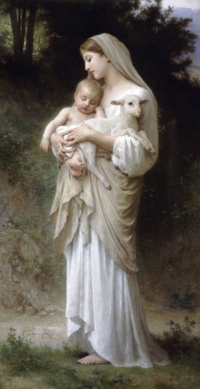Virginity
From The Art and Popular Culture Encyclopedia


Illustration: Fashionable Contrasts (1792) by James Gillray.
|
"The Septuagint scholars mistranslated the Hebrew word for “young woman” into the Greek word for “virgin.” It was an easy mistake to make because there was only a subtle difference in the spelling. So they came up with a prophecy: “Behold, a virgin shall conceive and bear us a son.” You understand this? It was the word “virgin” that caught people’s attention. It’s not everyday a virgin conceives and bears a son. But leave that for a couple of hundred years to stew, and the next thing you know you have the Holy Catholic Church." --Franky "Four-Fingers" in Snatch. |

|
Related e |
|
Featured: |
Virginity is the state of a person who has never engaged in sexual intercourse. There are cultural and religious traditions which place special value and significance on this state, especially in the case of unmarried females, associated with notions of personal purity, honor and worth. Like chastity, the concept of virginity has traditionally involved sexual abstinence before marriage, and then to engage in sexual acts only with the marriage partner. The concept of virginity usually involves moral or religious issues and can have consequences in terms of social status and in interpersonal relationships.
The term virgin originally only referred to sexually inexperienced women, but has evolved to encompass a range of definitions, as found in traditional, modern, and ethical concepts. Heterosexual individuals may or may not consider loss of virginity to occur only through penile-vaginal penetration, while people of other sexual orientations often include oral sex, anal sex or mutual masturbation in their definitions of losing one's virginity.
See also
- Almah
- Asexuality
- Born-again virgin
- Celibacy
- Sworn virgin
- Vestal virgin
- Involuntary celibacy
- Virgin birth
- Virginity fraud

